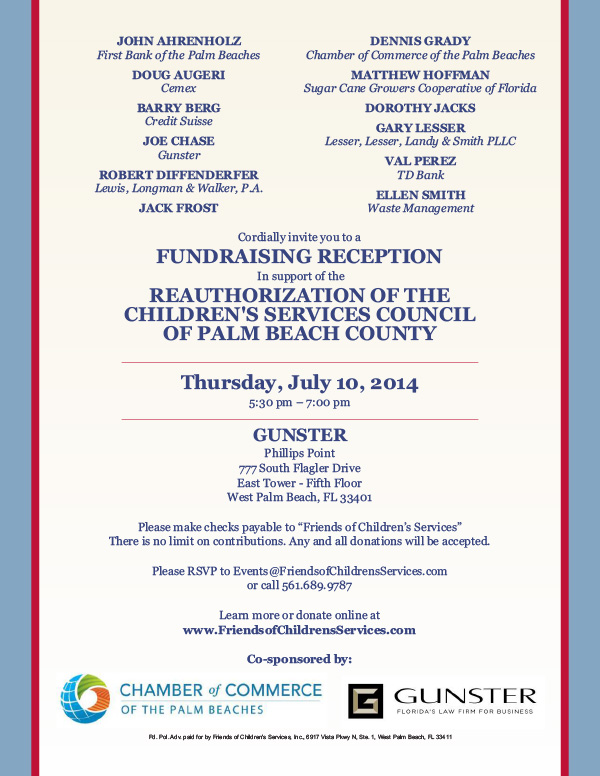Palm Beach County Friends,
I am writing to invite you to a reception I will be hosting here at Gunster next Thursday, July 10, from 5:30 to 7:00 PM, to help raise funds for the Children’s Services Council of Palm Beach County (the “CSC”) reauthorization campaign. It would really mean a lot to me if you could come out and help support this important cause. A flyer about this event is below. If you are able to make it to this event, please either send me a message letting me know or RSVP by sending an email to Events@FriendsofChildrensServices.com or calling 561.689.9787. Also, if you are interested in joining the host committee for this event, you can do so for a contribution of $1,000—please let me know if you are interested in serving on our host committee.
The CSC is one of our county’s most vital institutions. The CSC, an independent taxing district authorized by Palm Beach County’s voters in 1986 specifically to meet the needs of our county’s children, began operating in 1987. The CSC provides leadership, funding and research on behalf of Palm Beach County’s children, so they are born healthy, grow up safe, are ready to learn when they enter school, and have access to quality after school and summer programs.
Due to a 2010 state law, the CSC is required to go before Palm Beach County’s voters for reauthorization by 2016. Our County Commission put reauthorization on this November’s ballot. The purpose of the event on July 10 is to help raise funds for Friends of Children’s Services, an organization that has been formed to campaign for the CSC’s reauthorization.
Due to a 2010 state law, the CSC is required to go before Palm Beach County’s voters for reauthorization by 2016. Our County Commission put reauthorization on this November’s ballot. The purpose of the event on July 10 is to help raise funds for Friends of Children’s Services, an organization that has been formed to campaign for the CSC’s reauthorization.
For your reference, here are a couple of helpful websites regarding the CSC and the campaign for its reauthorization:
- This web page has some information about what the CSC is and what it does: http://www.cscpbc.org/the-csc-difference.
- Here is the web site for Friends of Children’s Services’ campaign to reauthorize the CSC: http://www.friendsofchildrensservices.com/.
Please don’t hesitate to send me an email or give me a call if you have any questions about this event, the CSC or the reauthorization campaign.
Thanks for your time, and I look forward to seeing you here at Gunster on July 10!


